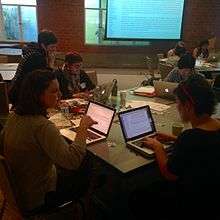Fembot Collective
|
| |
| Formation | 2011 |
|---|---|
| Founder | Carol Stabile |
| Founded at | University of Oregon |
Main organ | Ada: A Journal of Gender, New Media, and Technology |
| Website |
fembotcollective |
The Fembot Collective is an international collective of feminist media activists, artists, producers, and scholars that publishes the academic journal Ada: A Journal of Gender, New Media, and Technology.[1] Fembot has been a catalyst for multiple large scale feminist digital projects, providing the digital and social infrastructure for FemTechNet,[2][3] publishing the podcast series Books Aren't Dead,[4] and hosting collaborative hack-a-thons and Wikipedia edit-a-thons with Ms. magazine.[5] Although having been funded and supported by multiple institutions, Fembot is concentrated in the School of Journalism and Communication and the Center for the Study of Women in Society at the University of Oregon.[6]
History
The Fembot Collective was initially developed at the University of Oregon, where it was originally a research interest group led by Carol Stabile located in the Center for the Study of Women in Society.[4] Officially founded in 2011, the group grew out of conversations about the use of feminist ethics to guide transformations in open access and new media pedagogy that began as early as 2008.[1] Early projects for Fembot included the short zine series Laundry Day edited by Carol Stabile and Chelsea Bullock, and a feminist works series that spotlighted new media artists and critics.[7] Fembot launched its first issue of Ada: A Journal of Gender, New Media, and Technology in November 2012.[8]

Since 2015, Fembot has established a partnership with Ms. magazine around writing women academics, theorists, and athletes into Wikipedia.[9][10] The organization is currently led by Carol Stabile.
Ada: A Journal of Gender, New Media, and Technology and Controversy
Ada: A Journal of Gender, New Media, and Technology is a feminist open access journal published by the University of Oregon in collaboration with the Fembot Collective.[11] Notably, the journal challenges conventional academic journal practices by using an open peer review process.[12]
In 2014, Gamergate supporters targeted Ada: A Journal of Gender, New Media, and Technology as a site of "feminist propaganda," arguing that "feminist scholars have used the journal as an outlet for propaganda, allowing them to avoid the peer review processes of traditional journals."[13] In response, Fembot members and others created a bibliography of critical resources for studying the gendered dimensions of the Gamergate controversy, published by the International Communication Association.[14]
References
- 1 2 Rhee, Margaret (17 March 2015). "Hacking Feminism". Bitch Magazine. Retrieved 28 March 2015.
- ↑ "About the [FemTechNet] DOCC". Pennsylvania State University DOCC. Retrieved 28 March 2015.
- ↑ Losh, Elizabeth (2014). The War on Learning: Gaining Ground in the Digital University. Cambridge: MIT Press. pp. 146–148. ISBN 0262323265.
- 1 2 Stabile, Carol; Sawchuk, Kim (2012). "Introduction: Conversations Across the Field". Ada: A Journal of Gender, New Media, and Technology (1). doi:10.7264/N3RN35SV.
- ↑ Rhee, Margaret (13 March 2015). "Gender-Balancing Wikipedia, One Article at a Time". Ms. Magazine. Retrieved 28 March 2015.
- ↑ "Fembot Conference: Multiplying Standpoints and Participatory Feminism". Center for the Study of Women in Society. University of Oregon. Retrieved 28 March 2015.
- ↑ Ekpo, Patricia. "Currently Crushing On: Fembot Collective". Blue Stockings Magazine.
- ↑ "Research Newsletter". University of Oregon School of Journalism & Communication. Retrieved 31 March 2015.
- ↑ Rhee, Margaret (17 March 2015). "Hacking Feminism". Bitch Magazine. Retrieved 11 March 2016.
- ↑ Adamovic, Lea. "Fembot Initiative to again join Wikipedia Edit-a-thon". Around the O. Retrieved 11 March 2016.
- ↑ JOURNAL-TOC. "Ada: A Journal of Gender, New Media, and Technology". JournalTOC:. Heriott-Watt University. Retrieved 31 March 2015.
- ↑ Fredette, Michelle (28 August 2012). "Rewriting the Journal" (Academic Publishing). Campus Technology. Retrieved 31 March 2015.
- ↑ Straumsheim, Carl (11 November 2014). "#Gamergate and Games Research". Inside Higher Education. Retrieved 31 March 2015.
- ↑ Chess, Shira; Consalvo, Mia; Huntemann, Nina; Shaw, Adrienne; Stabile, Carol; Strommer-Galley, Jenny (November 2014). "GamerGate and Academia" (9). International Communication Association. ICA Newsletter. Retrieved 31 March 2015.